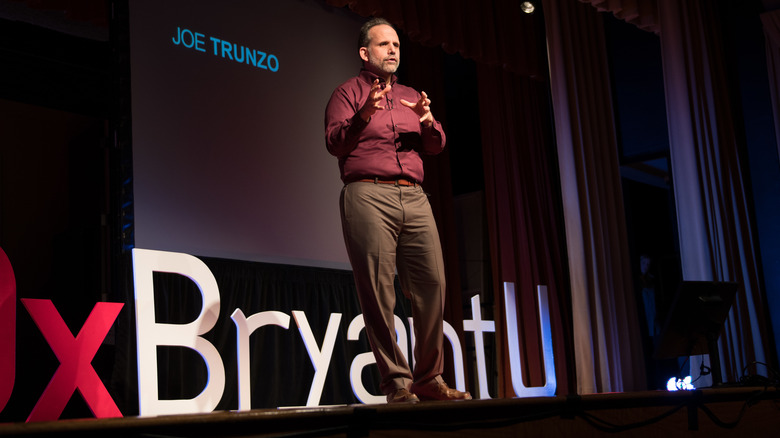Chronic Illness Expert Dr. Joseph Trunzo Explains What We Do And Don't Know About Long COVID - Exclusive
Though he's not a medical doctor, clinical psychologist Dr. Joseph Trunzo is something of an expert on chronic illnesses. He's spent decades of his career helping people cope with the sometimes drastic changes to daily life that come with chronic illnesses. Dr. Trunzo uses a form of therapy called Acceptance and Commitment Therapy, ACT for short, to help his patients build the resilience necessary to navigate the difficult situations that chronic illnesses present without avoiding their uncomfortable feelings.
Dr. Trunzo's work has become especially important in the age of COVID-19. According to the American Medical Association, between 10-30% of people who get COVID-19 will develop Long COVID, also known as Long-Haul COVID. People who develop Long COVID can experience symptoms for weeks, months, or even years after their initial infection. Today, millions of people who were healthy and thriving before getting COVID are now living with chronic illness. And unfortunately, doctors don't know a lot about Long COVID yet, which adds another level of emotional complexity to coping with it.
In an exclusive interview with Health Digest, Dr. Trunzo talked about Long COVID, what we still don't know about it, and how the uncertainty complicates coping with the disease.
Part of the problem is 'there are no Long COVID specialists'
Since Long COVID is such a new disease, even the doctors who have studied it extensively are not specialists in the same way as doctors who specialize in chronic illnesses that have been around for a longer time, like Multiple Sclerosis. Dr. Trunzo said that even the people studying Long COVID are pretty stumped by the disease because it doesn't behave quite like other chronic illnesses.
"Long COVID seems to be multi-systemic. That's problematic in that it's affecting multiple areas of the body, which means you're seeing multiple specialists, and you don't know where to turn," Dr. Trunzo explained. "There's a lot of difficulty around that. I'd say that's one of the major differences. If you have Multiple Sclerosis, you go see a neurologist. If you have cardiac problems, you see a cardiologist. But with long COVID, there are no long COVID specialists. Nobody knows what the hell this is. It hasn't been around long enough."
So many unanswered questions remain
Dr. Trunzo went on to say that though many patients with Long COVID are seeing multiple specialists, even those specialists don't have a lot of answers. No one knows how long patients with Long COVID will be sick, or if they'll ever get better. There are no medications for Long COVID and no definitive treatment protocols. Doctors don't even know why some people get over Long COVID while others don't.
"Some people are sick for 10 days, and they feel crappy for another month or two, but then they're okay," Dr. Trunzo explained. "Then, there are other people who have been severely debilitated for years at this point. What are the differences that indicate or determine which categories someone falls into?"
So, patients with Long COVID have to deal with the uncertainty of not knowing what their future will look like on top of living with their symptoms. Dr. Trunzo said that this makes dealing with Long COVID particularly difficult. However, he did offer some words of hope.
"Even if you have long COVID, even if it's turned your life upside down, even if you're suffering in almost immeasurable ways, there are ways to live better and to navigate that pain and that difficulty in a way that feels better than what you're feeling right now. That's my message of hope and optimism for folks who are suffering with this."
Visit Changemakers Books to order your copy of Dr. Trunzo's new book, "Long Haul COVID: A Survivor's Guide."



